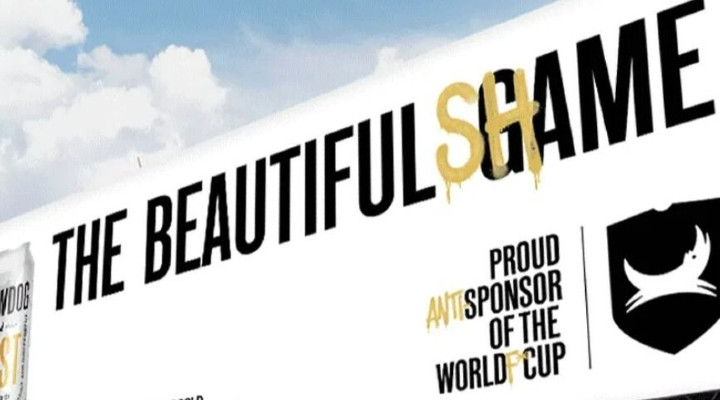The quadrennial football tournament known as the Fifa World Cup is the most-watched sporting event globally, but this year’s competition, set to commence in Qatar on 21 November, is drawing attention for all the wrong reasons. Qatar has been plagued by allegations of corruption, bribery and human rights abuses ever since it was selected to host this year’s World Cup, back in 2010. And the conversation has only gotten louder as the kick-off has gotten closer. A 2021 report in The Guardi
Guardian revealed that more than 6,500 migrant workers from India, Pakistan, Nepal and Bangladesh and Sri Lanka have died in Qatar since it won the right to host the World Cup.
More recently, the Netflix documentary, Fifa Uncovered, provided a detailed look at the long history of corruption and kickbacks within football’s governing body.
Now, many football fans and brands that have long been aligned with the sport face an uncomfortable question: can they still afford to support the World Cup?
The response from brands
The appalling treatment of migrant workers in Qatar is one of the key issues that has been raised by human rights organisations in recent years, leading some to question at what cost the new football stadiums and tourist accommodations have been built.
According to Reuters, Amnesty International has led calls for Fifa to compensate migrant workers in Qatar for human rights abuses by setting aside US$440 million, matching the prize money for the World Cup.
Another key issue is Qatar’s repressive stance on LGBTQIA+ issues. Homosexuality is still viewed as a crime in that country, and is punishable by death or torture.
For the global brands that tend to sponsor the World Cup, such as Adidas and Nike, which make many of the kits that the national teams wear, this is completely at odds with the values they claim to support.
To be fair, there will be some small signs of protest on the pitch, such as Belgium’s rainbow-coloured away kit, made by Adidas, in support of LGBTQIA+ rights, and the “One Love” armbands, which will be worn by the English and Welsh teams during the tournament. The armbands are meant to be a rallying cry for “standing against all forms of discrimination”.
The Danish team will be wearing all-black kits, made by Hummel, in an effort to honour the migrant workers who have died.
Off the pitch, Scottish craft beer brand BrewDog has launched an out-of-home advertising campaign in London, featuring such slogans as: “Proud anti-sponsor of the World F*Cup,” “The Beautiful Shame”, “Eat, Sleep, Bribe, Football”, and “First Russia, then Qatar. Can’t wait for North Korea.”
“Football is meant to be for everyone. But in Qatar, homosexuality is illegal, flogging is an accepted punishment, and it’s OK for 6,500 workers to die building your stadiums,” the brand stated, according to reports.
It is reportedly offering profits from its Lost Lager sold during the tournament to fight human rights abuses.
Too little too late
Kevin Finn, author of Brand Principles: How to be a 21st Century brand, believes the World Cup reinforces a dilemma that many businesses and brands are facing.
“On the one hand, there is a financial benefit to being associated with such a global, high-profile and lucrative event. But on the other hand, businesses and brands are facing headwinds from customers and society, where expectations of ‘doing the right thing’ have increased dramatically,” he told Inside Retail.
Whether businesses make decisions for genuinely ethical reasons, or simply to survive, Finn believes that consumers will ultimately see and acknowledge those who take a stand for a better society – those who put ‘doing the right thing’ above and before generating a profit.
But is it enough to simply wear a “protest” kit, or launch a strongly worded advertising campaign?
“It’s easy to be cynical and think those businesses, brands and football federations who are standing up for these rights aren’t doing enough. But perhaps the bigger question is why aren’t others standing up for these same issues?” Finn said.
He believes that knowing that there are businesses willing to take a stand can reassure others who are afraid to do so. Knowing that customers are rewarding and expecting this behaviour provides economic reassurance.
“As American author and educator Anna Lappé says, ‘Every time you spend money you’re casting a vote for the type of world [you] want to live in”. This is the new reality,’” he said.
Finn believes that we have put businesses and brands at the forefront of societal change.
“Businesses and brands need to remain relevant in society and that’s now being measured by the impact they make – because, where purpose is motivational, impact is measurable,” he explained.
In his mind, the business model is: impact = relevance = revenue. Consumers rarely make decisions based on how much revenue a company generates, he said, but many are now making choices on the impact companies make and how relevant they are in their lives.
“In fact, it’s not unreasonable to suggest that R.O.I in the 21st century will evolve into ‘return on impact,’” he said.
Whether that’s boycotting the World Cup in Qatar, or working inside it to make change as a sponsor, Finn believes it’s all about relevance – and that ultimately actions speak louder than intentions.
“It’s also worth remembering: every day we are all collectively designing our future – and history is watching,” he said.

